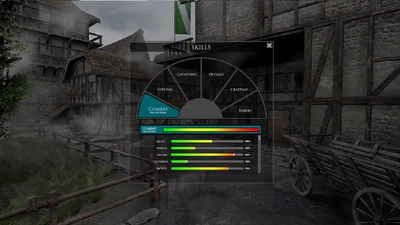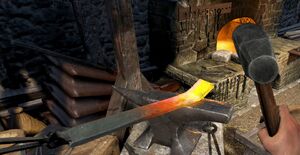While players may have different opinions about which skills makes up the best Champion, Explorer, etc., every character is made up of a combination of skills that span six top-level categories. In general, Champions will be made up predominantly of Combat Skills, Explorers of Survival Skills, Suppliers of Gathering Skills, Producers of Crafting Skills, Deviant and Bardic. However any of these skill trees can be mixed and matched with others creating a completely unique character.[1]

Early In-game view of the Skill view
Skill Trees
| Tree | Description | Examples |
|---|---|---|
| Bardic Skills | The skills of the academic and the performer - information and discovery |
|
| Combat Skills | A character’s ability to fight |
|
| Crafting Skills | A character's ability to produce goods |
|
| Deviant Skills | Those less savory, riskier skills that may aid in surviving more urban areas |
|
| Gathering Skills | A character's ability to gather and process raw materials |
|
| Survival Skills | A character's ability to survive in the wilds |
|
Skill Hierarchy
Beneath the top level of each skill tree there are secondary and tertiary skills which are referred to as Parent Skills. For example, below the Combat tree there is Melee, Ranged, Thrown, Defensive, and Tactics. Each of these is a Parent Skill which contributes to the successful execution of skills below.
Consider this skill tree:
As an example, 1H Axes, Swords, and Rapiers are all type of One-Handed Combat. Improving in One-handed Axes causes you to get better at One-Handed Combat. As a result, you'll see a small gain in all types of One-Handed Combat, including swords, rapiers, maces, and daggers. This represents generalized learning.
Skill Advancement
In an attempt to discourage endless grinding Chronicles of Elyria will institute a system of diminishing returns called "rewarding for failure." If you attempt a skill that is too easy for you, such that you can never fail, you won't learn anything and will never improve. In contrast, if you attempt something just beyond your current skill level, you’ll see a lot more character growth. After all, we learn a lot more from our failures than we do from our success.
Skill Tiers
Skills Mastery in Chronicles of Elyria is divided up into tiers with a percent mastery for each tier. The tiers are broken down as follows:
- Novice (0% - 29%)
- Apprentice (30% - 39%)
- Journeyman (40% - 49%)
- Expert (50% - 59%)
- Artisan (60% - 69%)
- Renowned (70% - 79%)
- Master (80% - 89%)
- Grandmaster (90% - 99%)
- Legendary (100%)
The percentage mastery reflects how proficient you are with a specific skill but also inversely reflects the percentage of people who will attain a specific skill tier. In other words, based on the amount of time it takes to level a skill, you can expect distribution of mastery across a server to look like the following:
- Novice: 100% of all people can achieve Novice in any given skill
- Apprentice: 70% of all people are likely to achieve apprentice in a skill
- Journeyman: 60% of all people will achieve journeyman
- Expert: 50% of all people will achieve Expert
- Artisan: 40% of all people will be Artisans
- Renowned: 30% of all people will achieve Renowned
- Master: 20% of all people will achieve Master
- Grandmaster: 10% of all people will achieve Grandmaster
- Legendary : 1% of all people will achieve Legendary

In-game view of someone hard at work
Put differently, we calculated how long it would take people to reach Legendary status over several lifetimes if they did nothing but work on advancing a skill. Obviously, that's not going to happen. So as people train and improve, the Soulborn Engine monitors progress and provides bonuses as necessary to ensure the top 1%, 10%, etc... will eventually reach the Legendary or Grandmaster tier.
You should also note those skill tiers carry across reincarnations and it will, in general, take a lifetime to become a Master, multiple to become a Grandmaster, and several to become Legendary.
Minimum Skill
All skills in CoE require a minimum amount of training in order to perform. Attempting a skill with a skill rating of 0% will always result in failure. To attempt a skill for the first time it'll be necessary to first receive training. There are a number of ways and places in which to receive training.
Books
In most cases it's possible to gain the minimum necessary training to begin practicing a skill simply by reading a book about it. In fact, in most cases, given a full encyclopedia on a subject, it's possible to raise a skill all the way to Apprentice. Beyond that, it requires specific, rare texts to raise your skill in this manner.
Teaching
Characters with the Scholarship skill can teach you other skills they know. This is generally an interactive process requiring both people to be online, however, sufficiently skilled characters can teach others via their OPC. To continue to gain knowledge through formal teaching, it's necessary the teacher have both sufficiently high Scholarship skill, and sufficiently high proficiency in the skill they’re trying to teach. In this way, it gets harder and harder to find good teachers the better and better you become.
In addition, they often say the best way to learn is to teach, and while that’s not 100% true here, teachers do develop their skills while teaching, in the same way they did before as the student.
Observation
Having a skill above 0% allows you to gain some skill points simply by observation. Being near someone performing a skill enough times will result in a passive knowledge transfer. However, root-level skills cannot be advanced beyond Apprentice via observation alone.
Practice
Once your skill goes above 0% you can begin practicing most skills on practice equipment. In the case of combat skills this will often be practice dummies. For other types of skills there are specific practice tools available which, through repeated use, can help slowly advance your skills. It’s assumed people will use these practice tools while offline via their OPC. Practice tools cannot be used beyond Journeyman skill level. One important thing to note, we believe “time = money.” As a result, practicing crafting professions that would normally consume natural resources in other games does not do so in Elyria.
References
- ↑ Walsh, Jeromy "Caspian" "DJ #8: Character Roles and Skill Advancement." Developer Journals - Chronicles of Elyria.
| |||||||||||||||||||||||||||||||||||||||||||||||||||||||||||||||||||||||||||||||||||||||||||||||||||||||||||||||||||||||||||||||||||||||
